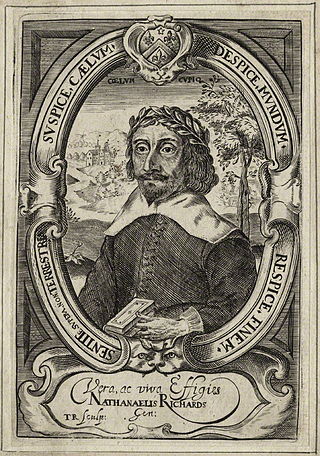Works
Peyton produced in London in 1620 the first part of a poem entitled The Glasse of Time in the First Age. The volume opens with addresses in verse to King James, Prince Charles, Francis Bacon, and the Reader. The poem consists of 168 stanzas, of varying lengths, in heroic verse, relating the biblical story of the Fall of Man. There are classical allusions and digressions into contemporary religious topics, Peyton writing as an opponent of the Puritans. In 1623 he c,ontinued the work in The Glasse of Time in the Second Age, and brought the scriptural narrative to Noah's entrance into the ark. A reprint appeared at NeinYork in 1886. [3]
Richard Herne Shepherd (1842–1895) was an English bibliographer.

John Quarles was an English poet.
William Preston was an Irish poet, playwright and essayist.
Annals of Philosophy; or, Magazine of Chemistry, Mineralology, Mechanics, Natural History, Agriculture and the Arts was a learned journal founded in 1813 by the Scottish chemist Thomas Thomson. It shortly became a leader in its field of commercial scientific periodicals. Contributors included John George Children, Edward Daniel Clarke, Philip Crampton, Alexander Crichton, James Cumming, John Herapath, William George Horner, Thomas Dick Lauder, John Miers, Matthew Paul Moyle, Robert Porrett, James Thomson, and Charles Wheatstone.
John Walton, also John Capellanus was an English Augustinian canon, known as a poet and translator.

Nathanael Richards was an English dramatist and poet, perhaps from Kent. He should not be confused with Nathaniel Richards (1611–1660), a cleric.

Thomas Penrose (1742–1779) was an English cleric and poet.
William Parsons was an English poet, one of the Della Cruscans.
Raphael Thorius M.D. was a London physician of Huguenot and Flemish background, known as a poet and humanist.
Thomas Wade was an English poet and dramatist.
John Critchley Prince (1808–1866) was an English labouring-class poet. His Hours of the Muses went through six editions.
Hugh Hughes was a Welsh poet.
William Hayward Roberts was an English born schoolmaster, poet and biblical critic, cleric and Provost of Eton College.
George Pettie (1548–1589) was an English writer of romances. His style influenced Robert Greene, and paved the way to euphuism.
Samuel Humphreys (c.1697–1738) was an English poet, librettist and translator. He is known for the words he wrote for Handel's oratorios Esther (1732), Deborah (1733), and Athalia (1733).
Thomas Smibert (1810–1854) was a Scottish journalist, writer and poet.
Robert Chamberlain (1607–1666) was an English poet and playwright.
John Holliday (c.1730–1801) was an English lawyer and author, a Fellow of the Royal Society from 1786.
Wye Saltonstall was an English translator and poet.

John Dancer was an Irish dramatist, connected with the Theatre Royal, Dublin. His works consist of several translations from Italian and French, original plays, and some miscellaneous stories and poems.
This page is based on this
Wikipedia article Text is available under the
CC BY-SA 4.0 license; additional terms may apply.
Images, videos and audio are available under their respective licenses.
![]() Media related to Thomas Peyton (poet) at Wikimedia Commons
Media related to Thomas Peyton (poet) at Wikimedia Commons![]() This article incorporates text from a publication now in the public domain : Lee, Sidney, ed. (1896). "Peyton, Thomas". Dictionary of National Biography . Vol. 45. London: Smith, Elder & Co.
This article incorporates text from a publication now in the public domain : Lee, Sidney, ed. (1896). "Peyton, Thomas". Dictionary of National Biography . Vol. 45. London: Smith, Elder & Co.


